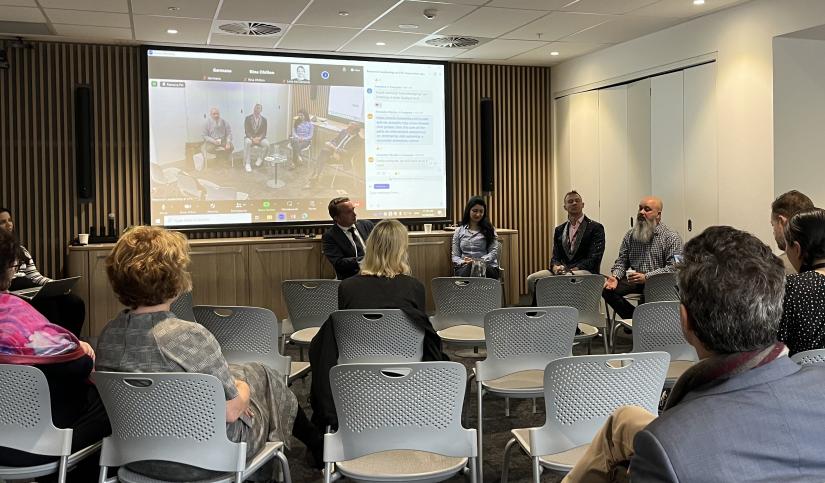Are you a leader in research? Do you consider yourself an innovator or entrepreneur?
Transforming ideas into reality: innovation and entrepreneurship

In last week’s Research Leadership professional development session led by Pro Vice-Chancellor (Research) Professor Chris Turney, Research Associate Professor Bradley Moggridge, Associate Professor Negin Shariati Moghadam and Professor Nick Hopwood discussed innovation, entrepreneurship and the process of transforming ideas into reality.
Look at today to do things for tomorrow
Associate Professor Bradley Moggridge from the Faculty of Science and Associate Dean of Indigenous Leadership and Engagement shared his Indigenous perspective.
“Indigenous knowledge is part of the way forward because that knowledge has come from thousands of years of connection, observation, impact and replication,” he said.
Bradley emphasised the value of identifying old knowledge as the way forward to create new knowledge in the process of innovation. He did, however, acknowledge the difficulty in forging these paths as Indigenous knowledge is still not widely recognised as evidence in the research community.
Indigenous knowledge is part of the way forward because that knowledge has come from thousands of years of connection, observation, impact, and replication.
Specialising in water science, Bradley’s research on groundwater informed his thesis and artwork which led to him being featured on Boston Radio and in The Australian newspaper. These media engagements have helped build understanding of the Indigenous connection to ground water and created new impact. With his research now appearing in national groundwater research strategies, Bradley champions cultural knowledge as evidence to understand Country and our water systems because it comes from generations of lived experience.
Setting the stage
Associate Professor Negin Shariati Moghadam from the Faculty of Engineering and IT and Director of RFCT lab identified how leaders can facilitate opportunities for growth for team members and create an environment in which they can reach their full potential.
Pro Vice-Chancellor (Research) Professor Chris Turney referenced an insightful quote from a book talking about innovation from a leadership perspective, "My job is to set the stage, not perform on it."
My job is to set the stage, not perform on it.
“Creating that supportive environment is very important if you want to make that magic happen, where everyone is empowered,” Negin said. “They can take risks, they can make mistakes, they can learn from their failures.”
Panel members recognised the need for acknowledgement and recognition to develop self-driven and motivated individuals because this is how they discover value in their work. They also identified the balancing act between providing team members with the flexibility to encourage the emergence of new ideas, whilst also articulating and achieving the team’s core goals, to ultimately create the next generation of leaders.
Creating that supportive environment is very important if you want to make that magic happen, where everyone is empowered. They can take risks, they can make mistakes, they can learn from their failures.
Connecting with community
Professor Nick Hopwood from the Faculty of Arts and Social Sciences shared his experience with SuCCEED Child Feeding Alliance, a unique collaboration between researchers, families and clinicians centred on helping children with feeding difficulties and their families.

Nick spoke of the power of storytelling to amplify and advocate. He emphasised how positive stories reduce the distance between children who tube-feed and the broader community, creating stories of joy and playfulness rather than hyper-medicalised narratives of suffering and pity.
“The feeding tube feeds your stomach, but it’s a shared meal that fills your hearts,” he explained, adding that “tubes are life-enabling, not lifesaving.”
Nick said that understanding the lived experience of communities was important. For example, when he learned that families wanted their kids to eat alongside other kids, SuCCEED pioneered the world's first tube-feeding picnic at Sydney Olympic Park.
Participate in Research Leadership training
The next session in the Research Leadership training series is Engaging with Impact beyond UTS. Attend this session to gain insights into forging meaningful collaborations, influencing policy and driving innovation for global impact.
When: 10 am - 11.30 am, 16 October
Where: RES Hub event space, UTS City Campus, Building 2, Level 5, Location 250.